Harold’s Blog: Virtual Council Meeting, Reopening NC, Federal Update and More
Cary, NC — This week included my youngest daughter’s birthday and my anniversary. It is part of a six-day span where we celebrate three birthdays and my anniversary.
Usually, it is a time of gathering and celebration. This year, due to COVID-19, we had to celebrate virtually through zoom. Unfortunately, virtual celebrations are now the norm for many all over the world.
Monday – Preparing for Virtual Town Council Meeting
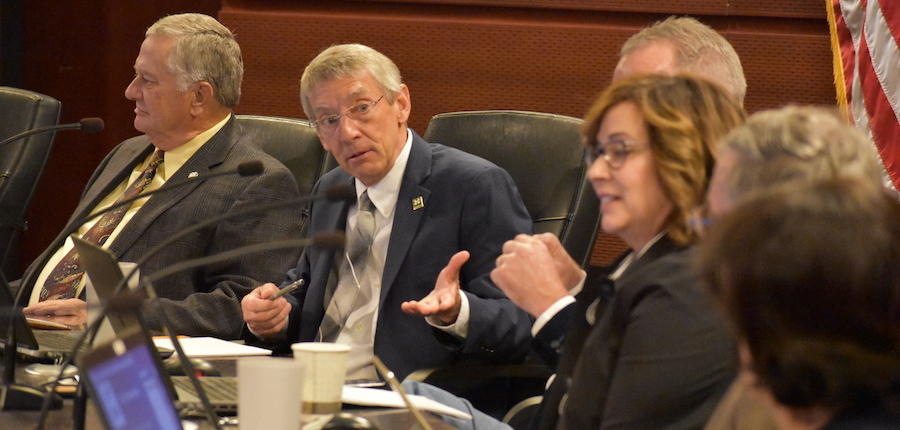
Monday I had my one-on-one tele-meeting with the town manager. We talked about the growing divide between county and cities on the Stay-At-Home orders. We also talked about the April 30th council meeting where Cary will change its ordinance to allow our own Stay-At-Home order if the state does not have one. We reviewed the seating reconfiguration of the council for the April 30th meeting to make sure we could function and practice social distancing. We also discussed and agreed that boards and commissions meetings should be canceled through May. Lastly, we talked about the Biobot report.
Looking at COVID-19 in Cary Wastewater
Biobot is a global leader in wastewater epidemiology. We used them to detect opioids last year with the $100,000 Bloomberg grant. Now we are using them to detect COVID-19 (SARS-CoV-2). The following are results from measurements taken at the Cary North and South water reclamation facilities:
April 2nd: USAfacts.org reported 39 new cases and 234 cumulative cases
April 6th: USAfacts.org reported 10 new cases and 314 cumulative cases
North Cary Water Reclamation Facility (collected April 2nd):
- SARS-CoV-2 virus in sewage detected per liter of sewage was 8662 copies
- Biobot estimates 300 cases or 0.4% of catchment population
North Cary Water Reclamation Facility (collected April 6th):
- SARS-CoV-2 virus in sewage detected per liter of sewage was 10054 copies
- Biobot estimates 375 cases or 0.47% of catchment population
South Cary Water Reclamation Facility (collected April 2nd):
- SARS-CoV-2 virus in sewage detected per liter of sewage was 2940 copies
- Biobot estimates 80 cases or 0.13% of catchment population
South Cary Water Reclamation Facility (collected April 6th):
- SARS-CoV-2 virus in sewage detected per liter of sewage was 32513 copies
- Biobot estimates 870 cases or 1.4% of catchment population
As a point of comparison, a large metropolitan area in Massachusetts had 36,400 copies of SARS-CoV-2 virus per liter of sewage. This translates to an estimated case prevalence of 2.8%.
About the data
Biobot’s method for detecting SARS-CoV-2 in sewage is available at www.biobot.io/covid19. Their approach relies on detecting genetic fragments of the virus that are excreted in stool, which does not determine if the virus is dead or active.
Biobot’s COVID19 case estimate:
They measured the SARS-CoV-2 virus in sewage by detecting its genetic signature. They converted measurements into a COVID19 case estimate by using the flow rate and population data provided by the treatment facilities, as well as published rates of SARS-CoV-2 shedding in stool.
Their case estimates and confirmed clinical cases:
Biobot’s COVID19 case estimates may not match the confirmed case numbers in the community for a variety of reasons. Clinical testing is limited and may not represent the entire infected population. Some COVID19 patients are asymptomatic or have mild symptoms and therefore do not seek out testing, but these patients may still be infectious. Their method will continue to improve and get more accurate as they analyze more samples. They are building a model to take into account person-to-person variability in SARS-CoV-2 shedding in stool. Learn more on their website, which includes links to their protocols and publications.
Data use:
The Biobot COVID19 case estimates provide an alternative metric to guide responses to the outbreak. We recommend that you share this information with local public health officials and see if there’s a way to work together to respond to COVID19 in your community.
Biobot is looking for genomic fragments of the virus’ DNA, not the full virus. DNA sequencing was completed on COVID19, which allows Biobot to do their work from a tiny particle, not an entire viral element; additionally, the wastewater specimen is pasteurized upon receipt by Biobot. So, Biobot never knows whether the virus is living or dead in the wastewater being sampled; that information isn’t needed for the study. Cary had 1245 cases of COVID-19 on April 6th as detected in our North and South plants. This is much higher than official data but is in line with antibody testing in other parts of the country. We plan on weekly measurements of our wastewater which will give us an indicator of how the virus is spreading in our community.
Monday night I participated in a tele-meeting with the Wake County Mayors Association. This was our regularly scheduled monthly meeting. As a result, we talked about finances, holiday party arrangements, and other organizational issues. We ended with a discussion on COVID-19.
Tuesday – Governor Cooper’s Press Conference Announcements
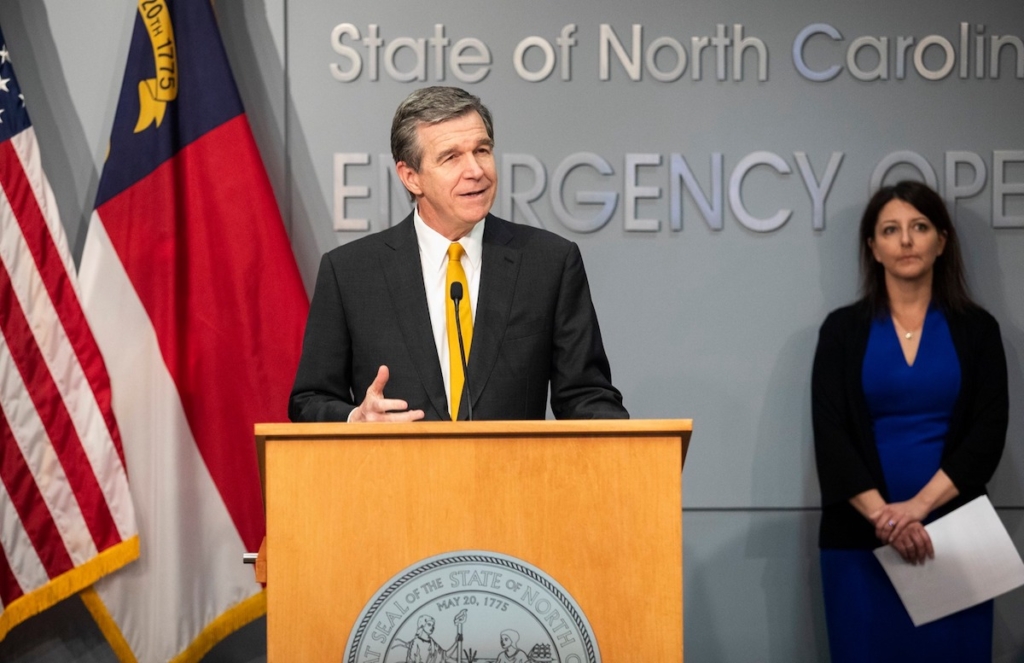
Tuesday I participated in the Governor’s press conference. At this press conference he announced money from the federal government will go to small businesses. He also announced an executive order that furloughed employees were now eligible for unemployment benefits. Other updates were provided, and the conference ended after about thirty minutes.
Wednesday – Economic Impacts of COVID-19 from Cary Chamber Meeting
Wednesday I participated in a virtual Chamber Eye Opening Breakfast with Dr. Mike Walden, an economist from NC State. Here are some notes I took from that presentation:
- It is estimated that half of the jobs in the Triangle could be performed with remote working.
- Before the virus the economy was very good with a record length of economic growth, a real GDP growth rate of 2%, low unemployment, and low inflation.
- This is an unprecedented “mandated” recession. Usually recessions begin by some excess in the economy. This will be officially called a recession by an independent economic think-tank.
- This recession will be deep but short. 52% of non-food retailers are closed. The real GDP is down 20% to 30%. The jobless rate is in double digits.
- It is estimated that the third quarter will have a small dip, no change, or small rise in the real GDP. The fourth quarter could be strong
- The Asian Flu of 1957-1958 caused 116,000 US deaths with half the population of today. There were no mandated shutdowns. It did spark a recession where the real GDP dropped 10%.
- To date there has been a $2.2 trillion of assistance to households and businesses. This will be paid for by generations to come (children, grandchildren, and greatgrandchildren).
- Recovery will be a balancing of health and the economy. Research shows the shutdown of the economy can be shorter the lower the infection rate. We have seen our local infection rate drop significantly.
- Our likely recovery path will be a steep decline, followed by a slowing decline, flattening, slow incline, and then a rapid incline. Graphically this would be in the shape of the letter U.
- The post-virus world will likely have more tele-everything. Globalization, supply-chains, and dense living will probably be revisited.
Thursday – State and County Stay at Home Orders
Thursday I listened in to the Governor’s press conference where he extended the Stay-At-Home order until May 8th and he laid out a three stage process for opening up the economy. Each one of the stages required certain metrics to be met.
Later Thursday I was contacted by a reporter from the N&O with questions about what I thought about the Governor’s order and whether Cary would stay with the Wake County order. Here was my response:
“I believe the Governor’s data approach to reopening North Carolina makes sense and I support it.
As you noted the Wake County order expires on April 30th. Before the last time they extended, Wake County modified their draft to accommodate several of the Wake County mayors concerns with the order. As a result, all Wake County municipalities signed on until April 30th. At 5 PM this evening the Mayors Association will have a tele-meeting (we have been meeting twice a week). It is my understanding that this meeting will include Chairman Ford and several medical professionals. This is to help several mayors who are looking for additional data before signing on with Wake County again. One of the sticking points is the gathering of 0 (Wake County) as opposed to 10 (state). Some mayors like the 0 because it sends a message. Most of the mayors prefer 10 because 0 is unenforceable.
It appears, from the Wake County data, that the new infection rate is slowing. In fact, we have had single digit increase in the last couple of days. That shows social distancing is working so I would not be in favor of tighter restrictions at this time.
I can’t speak for the other municipalities but based on my conversations I don’t believe all mayors will sign on with the Wake County order and will sign on with the state instead.
As for Cary, we have dozens of staff members who make up our EOC. They will analyze the Wake County order when it is drafted and make a recommendation to me. At that time, I will determine if it is best for Cary to go with Wake County or the state order.”
Thursday evening the Wake County Mayors held a tele-meeting. Wake County Chair Ford participated as well as the county manager and several key staff and health experts. Almost all Wake County Mayors were participating. In his remarks Ford stated he was pleased with the Governor’s order and was leaning toward not extending the Wake County order. He did say that he hadn’t had a chance to talk with other commissioners about letting the order expire.
Thursday night we celebrated the birthday of my youngest daughter, Cara, via zoom. My daughter from Brooklyn, my son-in-law stationed in the Middle East, and my wife and I participated. While it was very strange for me, we all talked and celebrated for about an hour and a half including everyone’s pets. As I mentioned earlier, this type of virtual celebration is going on in families all over the world. It is crucial that we all stay in touch with each other during this time especially if you are celebrating.
Friday – Inspections, Development and Rezoning Press On
Friday I participated in a webinar hosted by the Cary Chamber of Commerce. In the webinar the town staff went over current processes for building inspections, development review and approval, the rezoning process, and the planning associated with future meetings. Staff noted that the number of permits and applications have not slowed during the Stay-At-Home order.
Later Friday I participated in a meeting of the North Carolina Metro Mayors. Here is a summary of that meeting from the Executive Director:
Federal Update
- Congress has passed three rounds of aid associated with COVID-19.
- Yesterday, they passed round “3.5” – We were hopeful there would be additional aid for local governments. It was included in the House package, but the Senate did not concur, so specific aid is not included in this latest legislation.
- There is a big push to get local government aid in the next federal round of legislation.
- The first 3.5 rounds have been specific to addressing the battle against COVID-19 with very little “stimulus or economic loss aid.”
- We expect round 4 which will be taken up in May to be more focused on economic recovery.
- It is important to talk to the state’s Congressional delegation and Senators on the important need to aid local governments in the next round of legislation.
- The Coalition is working with NCLM and NCACC to have a strong, united voice in expressing local governments’ need for help.
- We will continue to engage on this issue and will likely have a call next Thursday specifically related to federal aid. The call will be with the Governor’s staff, and perhaps federal lobbyists with local government expertise, to talk about federal programs and the prospects of future help from Washington.
Legislative Schedule Update
- The NC General Assembly will return next Tuesday, April 28 for a COVID-19 specific session.
- We expect the legislature will be there a limited amount of time (likely under 7 days).
- The legislative building will only be open to members, staff, and credentialed press. Votes will be held over multiple minutes instead of seconds to limit the number of members in the Chamber at one time.
- There is a general agreement on the framework for what will be done when they return, but still a lot of discussion between the two chambers as to the priorities that needs to be funded and at what level (ie: hospitals, small businesses, cities, counties, etc.)
- We expect the legislature to approve a consensus, bi-partisan bill and adjourn until the end of the fiscal year (June 30). We expect them to return later – maybe in July, to work on a budget and other pressing legislation.
- The legislature is delaying their usual “short session” budget adjustments due in large part to a significant amount of under collections making it unclear at this point on the amount of money they will be working with to craft a budget. The federal and state COVID-19 delay in income tax filing requirements is central to this delay. Plus, the unknown impact of the economic slowdown – and the restart/or easing of restrictions – makes it difficult to project revenues for the year.
COVID-19
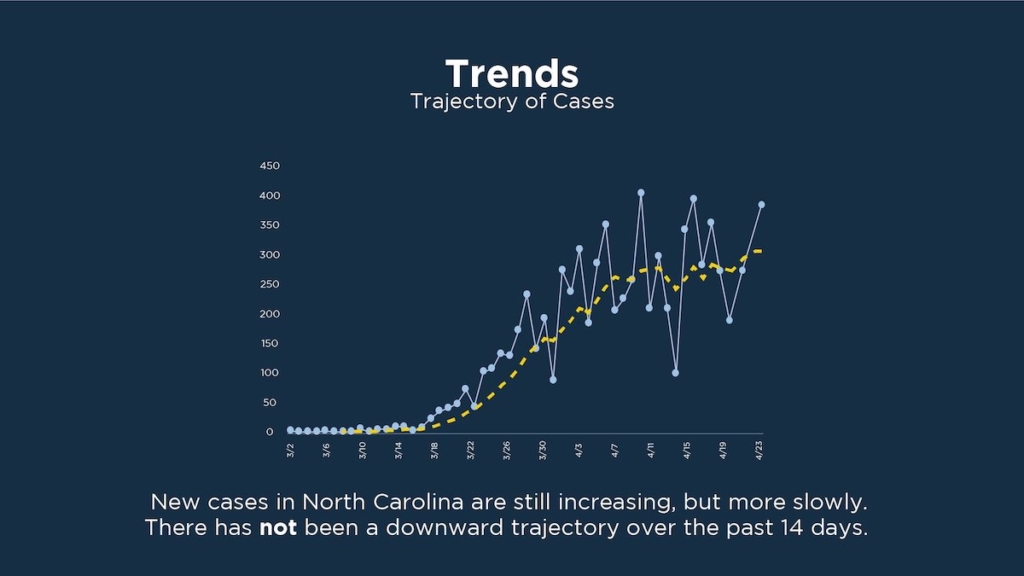
- Governor’s COVID Task Force – Business Workgroup – Mayor Allen Joines, a workgroup member:
- This is a short-term workgroup chaired by members of the COVID-19 Task Force and DHHS staff. The workgroup includes business leaders, associations, and public health experts with the purpose to receive feedback and input on strategies to help limit the spread of this virus moving forward. Gary Salamido is leading the calls.
- The first meeting was held last week and chaired by Gary Salamido, President of the NC Chamber. A number of cabinet secretaries, state officials, and numerous business leaders participated.
- The meeting gave business leaders a chance to discuss their concerns and current circumstances as well as the economic impact the COVID-19 pandemic has had on their businesses.
- DHHS also went through a detailed re-opening scenario, similar to what was laid out by the Governor yesterday.
- There will be another meeting next week.
Governor’s Executive Order 135
- Yesterday, Governor Cooper issued an Executive Order extending the Stay at Home Order to May 8.
- Based on meeting certain targets and data points, the state will go through a three-phase process of re-opening.
- President Trump’s Task Force suggested three-phase re-opening and the Governor Cooper’s approach are very similar, almost identical.
- The primary difference is the federal plan requires a reduction in target numbers while moving through the phases. The state plan allows to move forward with the next phase so long as numbers remain level (rather the federal task force suggestion that requires a REDCUTION in target figures). The Governor’s team bases that difference on the fact that NC has been able to keep the impact of the virus at comparatively low level – therefore level indicators rather than decreasing impacts is more appropriate.
NC House COVID Working Groups
- House Select Committees have been meeting remotely focusing on four topics (Health Care, Education, Economic Support, Continuity of State Operations).
- It is important to remember that while bipartisan, these are House only workgroups, so the legislative proposals being generated reflects the interest of one chamber, although we are hoping to see consensus with the Senate.
- We anticipate many of the individual working group bill drafts will be rolled into one large omnibus COVID-19 bill to expedite the voting process.
- We also anticipate provisions in the COVID legislation will address local government open meetings law and will accommodate local governments holding meetings through various means; as well as, grandfather in actions that have been taken from March 1 forward.
Economic Support Working Group
Small Business Emergency Loans
- Makes funds available to Golden Leaf Foundation for entities to provide emergency loans for small businesses.
- This week’s bill draft increased the funding cap from $25M to $75M, increased the employee threshold from 50 to 100 FTE equivalents, and extends the term of the loan from 54 to 66 months.
- This is similar to the loans that are put in place during hurricanes (NC Rapid Recovery)
Education Working Group
- The committee met this week and unanimously voted to approve the proposed bill draft.
- This bill draft includes additional provisions that were not in last week’s bill draft including some related to the school calendar.Allows remote instruction to satisfy the statutory instructional time requirement.
- Waives attendance enforcement requirements during the school closure period.
- Jump Start Program – States the intent of the General Assembly to provide for supplementary summer instruction in August 2020.
- Allows public school units to begin the school year as early as August 17, 2020.
- Governor Cooper will make an announcement this afternoon related to K-12 public schools. We expect him to officially close schools for the remainder of the school year.
Transportation
DOT Funding Crisis
- There was a State transportation funding crisis before COVID-19 due to MAP Act settlements and disaster experiences.
- The COVID-19 pandemic has exacerbated this crisis due to historically low levels of gas tax and vehicle sales tax which is a primary funding source for DOT.
- DOT provided a detailed letter this week to the House and Senate Transportation Chairs about the types of projects they will have to shutter for the foreseeable future.
- Currently, the only projects they are moving forward with are those with matching grant funds with the federal government and projects that are backed by the NC bonds.
- In the Continuity of State Operations Working Group this week, a provision was added to a bill draft that would lower the Department’s floor of cash balances from $300M to $125M for one fiscal term.
- There is some movement among transportation advocacy groups to request extra funding in addition to lowering the floor (AFTER THE MORNING CALL – ADDED: advocates are seeking as much as $300m – and at the Governor’s 2pm Press Conf he also requested and ADDITIONAL $300m for NCDOT to make up lost funds related to COIVID-19). We are gathering more intel on this issue and will provide you with more information as it becomes available.
Public Safety
- Nothing New to Report
- REMINDER – Under the Governor’s testing protocol, first responders have the same priority for testing as health care workers.
Economic Development
- State Loan Funds for small businesses (see above under Economic Support Working Group)
- As you work through your budgets, start identifying for future stimulus packages projects that would be “shovel” ready and good prospects for stimulus related funding opportunities.
Local Revenues/Local Control
Federal Aid to Eligible for Locals thru NCGA
- $2.4B has been deposited to the State’s Treasury as part of the Federal CARES Act and other rounds of federal aid.
- The money must be used for the specific costs and programs RELATED to COVID-19 ONLY.
- The legislature will be allocating this money and we expect them to be extremely prescriptive in who gets the funding and what the funds can be used for.
- We will be working with NCLM to figure out how local governments can tap into these funds. (AFTER THE MORNING CALL – ADDED: Governor’s 2pm Press Conf he called for $300m for aid to be distributed to ALL counties and municipalities).
- Some local governments should have received some funding from CARES Relief Act in your accounts – CDBG ENTITLEMENT COMMUNITIES (cities of 50,000 pop or over). This funding is flexible, and, can treated as standard CDBG funds. It can be used to match other federal grants or maybe even supplant local funds for allowable purposes. Non-entitlement communities should contact NC Commerce for more information on how to access these ADDITIONAL funds that must flow through the state. It is notable – the additional federal appropriation of CDBG in the CARES Act is nearly as much as a normal annual CDBG appropriation – really good news.
Town Manager’s Report

The town manager, Sean Stegall’s report for this week includes:
Manager’s Message to Council
As I continue to experience a range of emotions each and every day, that being said, pride and optimism have remained front and center. As we come to a close on pandemic week 6, I am hopeful that there is a tiny light beginning to emerge at the end of a long tunnel. The time away from Council and staff has forced me to focus on what matters most and what needs to be preserved after the pandemic. I can say without reservation that the number one thing I miss the most is our time together, so I am excited to see you all next week for the Virtual Town Hall meeting.
The first ever Virtual Town Hall meeting, on Thursday, April 30, at 6:30 p.m. is an excellent way for our Council to connect with citizens. This event will be broadcast live on the Town of Cary website, YouTube, and CaryTV. The purpose of the Town Hall is to update citizens on ongoing efforts and operations surrounding COVID-19. In a news release that went out today we asked our residents to submit questions for you to answer during the broadcast. To view the full release, click here.
I look forward to seeing you next week.
Sean
Operational Framework & Update
In this week’s email to staff, Deputy Town Manager Russ Overton reinforced my message early in the week that the work of adaptive leadership, should we choose it, is mobilizing people to tackle tough challenges and thrive. I am proud of the collective action our staff is taking to overcome and thrive during the COVID-19 crisis. One example of this mobilization is our Procurement team collaborating with other departments to create specific COVID-19 contractual language for upcoming contracts, amendments, and task orders to ensure continued safety of our contractors, staff, and residents. There are many other examples of tackling challenges and I anticipate many more in the future to propel our community to a safe economic rebound.
In addition, the message provided clarity around the Virtual Town Hall meeting on April 30 and the next regular Council meeting on May 7. There will be further information released next week about the format and agenda of the May 7 meeting.
The weekly operational report brings a close to the week’s activities outside of the Emergency Command Center (EOC). Please take a moment to review the weekly operational report.
Departmental Updates
Included below is a summary-level overview of the operational activities continuing to take place during this health emergency.
Cary Utilities conducted a regional kick-off meeting with our Jordan Lake water intake partners–Chatham County, Morrisville and Apex –to begin work on a Source Water Protection Plan. This virtual meeting also discussed planning for an updated water system Emergency Response Plan, which is a requirement of America’s Water Infrastructure Act.
Construction of the 2020 Water Main Replacement projects are expected to start in May. This year, proactive water main replacements are planned for a portion of Academy Street in front of Town Hall, a portion of Griffis Street, Pond Street, Rose Street, Gordon Street and Washington Street. The second phase of Walnut Hills subdivision will also be included (Sturdivant Drive, Manchester Drive, Kimbolton Drive, Ivy Lane, Lyerly Lane, Champion Drive, Lane Drive and Askham Drive.)
Thanks to the Cary Page Rotary for delivering breakfast to our solid waste crews earlier this week!
Development plans that were in the queue before COVID-19 continue to move forward, including Weston Parkway Hotel, Duke Health, and Wavery Place.
Both building and infrastructure inspections remain steady.
There were no new rezoning cases submitted for May. Staff is preparing for the May 7 virtual Council Meeting.
A special utility bill insert about the suspension of late fees and delinquencies, along with information about Aquastar, where to pay bills while Town offices are closed and confirmation of safe drinking water was developed for the BUD Newsletter.
With the cancellation of all PRCR programming through the end of May, 169 public reservations were cancelled ($1,500 refunded, an additional $70,000 transferred to a later time). In addition,1,800 registrations were cancelled resulting in $99,000 refunded.
Legislative Stimulus Advocacy
On April 17, Cary submitted a letter to US Senators Burr and Tillis and US House Members Price and Holding requesting that direct funding be provided for lost revenue to local governments. Local governments with populations under 500,000 currently do not qualify for direct funding through the CARES Act. Therefore, additional specifically for local municipalities is critical to enable us to sufficiently respond to the COVID-19 pandemic, continue to provide services to our residents, and can help our economy rebound.
The State of North Carolina is expected to receive $4,066,866,177.50 in total funding. While states have the authority to transfer funds to other local governments, guidance does not specifically direct them to do so. Cary is now exploring opportunities to communicate the financial impacts of the COVID-19 pandemic at the state level and will continue to push for direct relief at the federal level in the next stimulus package to help backfill loss of revenue.
NCDOT Work Along Aviation Parkway
Weather permitting, beginning Friday, April 24 to Sunday, April 26 NCDOT is planning to close Aviation Parkway as well as east and westbound 1-40 to perform bridge demolition of the existing Aviation Parkway bridge across 1-40. Traffic will be directed to follow McCrimmon Parkway to Airport Blvd to I-40 as an alternative route. Cary citizens wishing to access RDU via Aviation Parkway should take an alternative route such as Harrison Avenue, NC-50, Airport Blvd, and McCrimmon Parkway to access I-40 and RDU. This work is part of the NCDOT Aviation Parkway Interchange Project.
Cary Chamber Eye Opener Goes Virtual
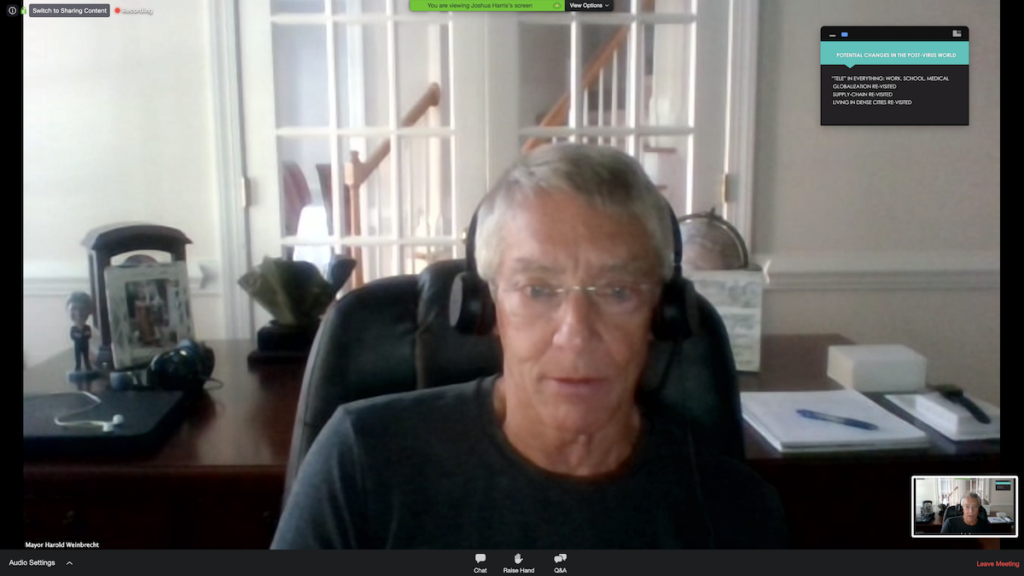
On Wednesday, the Cary Chamber of Commerce held their monthly Eye Opener event virtually. Mayor Weinbrecht spoke to the audience about how Cary is well-positioned, and he is working to get the local economy going again. The event also featured Dr. Michael Walden. He spoke about the economic impact of COVID-19 and predicts that the economic impact will be deep but short. He also said he thinks that the North Carolina recruitment brand has not been damaged. A video is available to those interested in watching.
Development Process during COVID-19
On Friday, Scot Berry, Cassie Schumacher-Georgopoulos, Debra Grannan and Brian Stark were panelists on a webinar about “Adapting the Development Process during COVID-19.” The idea for this event originated with Jacob Rogers of the Triangle Community Coalition and he worked with the Cary Chamber to expand this content to a broader audience. Approximately 65 people attended virtually, and questions focused on how Council Meetings and public hearings may look moving forward.
Employee Technology Trainings
Cary’s digital transformation progresses as staff continue to adjust to working from home, demonstrating adaptability through an increased proficiency across our technology platform. Over the weeks there have been numerous opportunities for trainings to advance skills with our OneCary Platform technologies. This past week, for example, a Box Refresher workshop resulted in record attendance and engagement from staff.
The change in work environment as well as staff’s willingness to apply what they are learning has resulted in a 10% increase in Box adoption and thoughtful usage over the past thirty days while adjusting to this new normal. Other trainings being offered include classes on the Microsoft Office platform, as well as WebEx for virtual meetings. We are excited to see advancements in proficiency across our technology platform, enabling staff to continue to meet citizen needs in creative ways while working remotely in this unprecedented time.
This investment continues to propel the organization forward and helps transform the way we work no matter where we work.
NC Railroad Crossing Safety Improvements
The NC Railroad crossing at Harrison Avenue has been a persistent spot for safety issues and crashes. This week, NCRR gave approval to remove a tree along Harrison Avenue that blocks a streetlight that potentially provides needed lighting for the crossing. Additionally, staff has developed a marketing plan to bring more attention to the railroad tracks. This aligns nicely with NCRR plans to resurface the track next month, in addition to improved pavement marking and landscaping work.
White Oak Greenway Pedestrian Tunnel
For Earth Day this week, Cary partially accepted and officially opened the newest and last section of the White Oak Creek Greenway. This provides a continuous 7-mile greenway from Fred G. Bond Park to the American Tobacco Trail and is part of the East Coast Greenway. A dedication event which was initially scheduled for National Trails Day in June 2020 has been postponed.
NC Traffic Data During COVID-19
The below data was compiled by NCDOT after being provided by many of the traffic management centers across the state, as well as supporting data from traffic signals that NCDOT operates. As you can see, Cary has had the largest decline, an indication of our citizens adhering to the Stay at Home orders.
Moody’s Annual Update Report
Credit rating agency Moody’s released an annual update report on Cary for 2019 late last week. The report mentions the potential impacts of the COVID pandemic, however, finds no material immediate credit risks for Cary. The report states that Cary’s credit position is extremely strong based on four key areas:
- Economy and Tax Base: Cary has an exceptionally healthy economy and tax base with a median family income of 166% of the national level.
- Finances: A robust financial position is based on cash balances and fund balance that are notably above the US median.
- Debt and Pensions: Cary’s obligations are manageable and lower than US medians.
- Management and Governance: Property tax revenues and expenditures are predictable, and Cary has flexible authority to set the tax rate.
Additional Information of Interest
I’ve found the following articles to be particularly interesting this week and wanted to share with your for your reading pleasure:
- The Untold Story of the Birth of Social Distancing, The New York Times
- The Psychology Behind Effective Crisis Leadership, Harvard Business Review
Get in Touch
Emails from citizens were mainly requests to “re-open Cary”. Some “demanded” the reopening of Cary. Cary is mandated to follow the state’s Stay-At-Home order. We must do what they require. Having said that, Cary’s EOC has been planning for weeks on how we might reopen businesses once the time is right and we have the authority.
The new infection numbers for Wake County from April 18th through April 25th are 13, 13, 3, 15, 7, 7, 11, and 10. The numbers are continuing to go down and flatten.
Social distancing is working. Please keep practicing guidelines so that we can get that number down even lower.
Next week’s activities include staff meetings, Wake County Mayors Association meetings, a meeting of the North Carolina Metro Mayors, and a virtual town hall meeting.
Well, that is all for this week. My next post will be on Sunday, May 3rd. Although I have Facebook and Twitter accounts those are not the best means of communications with me. Please send all Town of Cary questions or comments to Harold.Weinbrecht@townofcary.org and email personal comments to augustanat@mindspring.com.
From the blog of Cary Mayor Harold Weinbrecht. Town council and Sean Stegall photos by Ashley Kairis. Other photos courtesy of the Town of Cary and the NC Governor public Facebook page.

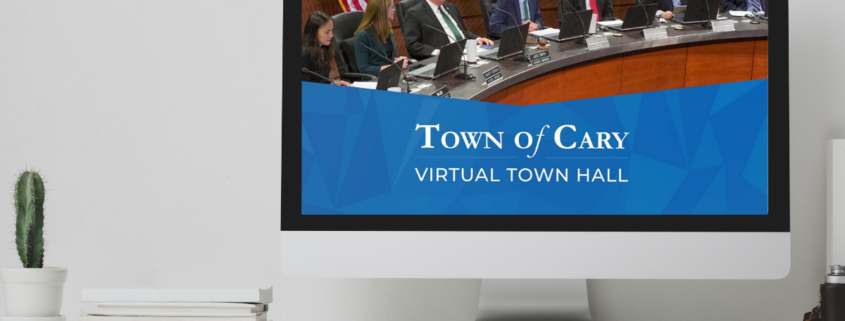


Completing the greenway between Bond Park and the American Tobacco Trail was HUGE! I’m now able to bike almost exclusively on greenways from downtown Cary to Durham via this route. Each time I ride the white oak greenway I’m reminded how important this network of trails is and I love seeing so many people using it. I believe this new trail rivals that of Raleigh’s Neuse River Trail. My hope is that Cary greenways continue to get better with more connections and segments. If only there was a greenway along High House Road connecting Higgins Greenway to Bond Park, we would have a main artery connection for downtown Cary to access Bond Park safely via bike once the final phase of the Higgins Greenway is completed.